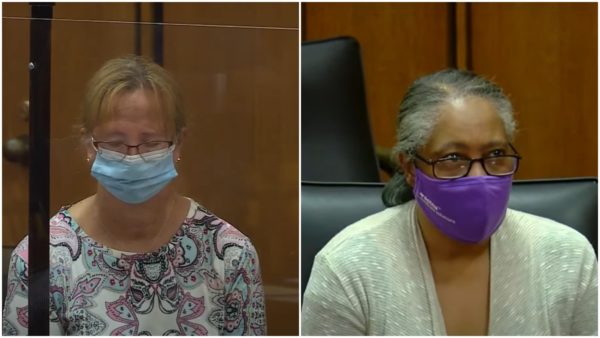‘Two Extremely Different Results’: Black Woman Sentenced to Prison for Stealing $40K While White Woman Who Stole $250K Gets Probation In Same Ohio County
Advocates are highlighting a concerning racial disparity after two Cuyahoga County Court judges handed down very different sentences to two women for stealing. In one case, a white woman stole almost $250,000 from the village of Chagrin Falls and Judge Hollie Gallagher sentenced her Aug. 2 to two years in probation.
In another case, a Black woman stole $40,000 from Maple Heights City Schools and was sentenced to 18 months in prison before Judge Rick Bell the next day.
The Black woman, Karla Hopkins, was a secretary at the school and the white woman, Debbie Bosworth, was a clerk at the village. Both crimes are classified as third-degree felonies. Photo: 19 News/ YouTube screenshot.
The Black woman, Karla Hopkins, was a school secretary, and the white woman, Debbie Bosworth, was a clerk at the village. Both crimes are classified as third-degree felonies.
The disparate sentences of two women who both stole public money have reignited calls to create a statewide sentencing database in Ohio to make sure judges dole out equivalent punishments.
Ohio Supreme Court Justice Michael Donnelly, who supports the proposed database, asked, “Are we satisfied with a system that would allow for two extremely different results like this?” when he spoke to The Cleveland Plain Dealer about the cases.
“The laws provide extreme discretion to trial court judges, to deal with sentencing criminal defendants. But there are no guardrails on the system to keep that sentencing power in check,” Donnelly said.
Judges considering a sentence could enter several factors into the database, including the number of victims involved in the crime, and whether restitution was paid. The judge could then compare the case to similar ones and their sentences across the state in the database, which includes information on race, gender, and criminal history.
Gallagher, the judge who sentenced Bosworth after she was stole $238,000 over a 20-year period, said she didn’t think the 53-year-old deserved prison time because she made good on her promise to repay more than $300,000 before her sentencing. Bosworth agreed to forfeit more than $200,000 in her public employee pension, and wrote another $100,000 check at her sentencing to cover other costs.
Bosworth was found guilty of all charges after facing a 22-count indictment for theft in office, tampering with records and money laundering. If Bosworth violates terms of her probation she could be sentenced to 63 years in prison.
Hopkins stole about $40,000 from Maple Heights High School between July 2017 and June 2018. The 51-year-old pleaded guilty in June to one count of theft. Her defense attorney said she’d struggled with mental health problems and a gambling addiction but had completed an eight-week inpatient treatment program following her arrest.
After participating in a job development program, Hopkins was set to start a new job just prior to her sentencing. She had also saved $5,000 and given it to her attorney to begin repaying the money she stole.
Local Black leaders told The Plain Dealer that the disparate sentences have damaged the credibility of the criminals justice system, and demonstrate that judge disproportionately punish people of color. The leaders have called on the county’s judges the database. So far, just 10 of Cuyahoga County Common Pleas Court’s 34 judges have committed to signing onto the pilot program.
“It’s kind of hard to figure how you can end up with results that are so different for similar kinds of actions,” former longtime Cleveland Municipal Court Judge Ronald Adrine told the newspaper. “Cases like these point out the need for the system to do a better job of reviewing the data because there’s lots of disparity between the way that people of color and white people are treated. But it doesn’t get captured because nobody’s really looking.”
Donnelly noted that sentencing disparities have prompted officials to take action in other states. “We found instances where a Black defendant on paper was exactly the same as a white defendant.
And the Black defendant received a 26-year sentence, and the white defendant received a two-year jail sentence,“ Donnelly told Cleveland TV news station WOIO. “That’s the kind of disparity that caused lawmakers in the state of Florida to react immediately and move in this direction towards the collection of necessary data.”
Advocates hope the database will help shed light on sentencing disparities in the state. Attorney Susan Moran told WOIO some judges might perceive the system as a challenge to their authority.
“It takes away the power a little bit, right? It challenges them,” said Moran. “You know, a certain judge, certainly a judge that’s been on the bench for 30 years, doesn’t want to be told that they’re doing it wrong, or that they lack perspective or that they are out of line with everybody else. That’s insulting to them.”

